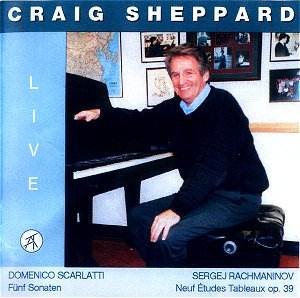I have very clear memories of the 1972 Leeds Competition
– was it really thirty years ago? – but my memory had made a curious
slip, for I was convinced that Craig Sheppard had won first prize and
Murray Perahia had come second. Maybe it’s because the image I retain,
of the tall, handsome young American playing a Rachmaninov concerto,
is the image of a typical prize-winner, maybe it’s because it tends
to be the way of the world that the leading international pianists,
such as Perahia has been ever since, usually come second or worse in
the big competitions. But no, the first place went to Perahia and, in
accordance with the "winner takes all" principle that governs
these things, he has never looked back. Craig Sheppard has certainly
not disappeared from view (nor, for that matter has Eugene Indjic, who
came third) but I have not had the occasion to follow his work He made
a few recordings for Classics for Pleasure soon after his Leeds success
but his career on disc has been sporadic. The present disc is one of
four issued by AT, consisting of live performances. The other three
contain Bach’s Goldberg Variations and 5th Partita, Beethoven’s
Diabelli Variations with Scriabin’s 5th Sonata and a Schubert
Impromptu, and Chopin’s Preludes together with the op. 11 Preludes of
Scriabin. I have received all four for review and I considered bunching
them together in a feature article. However, in view of the fact that
each of the other three CDs is centred around an absolute cornerstone
of the piano repertoire which demands detailed comparison with other
versions (and in so far as I have dipped in, Craig Sheppard’s performances
deserve such treatment), an article of the kind would be enormously
long and would take some time to prepare. So I shall start by commenting
on what is, from the reviewer’s point of view, the least demanding disc.
As well as playing, Sheppard provides his own notes.
These are brief but very much to the point. He does not don the musicologist’s
cap, neither does he blind the reader with science, but he seems to
have a good understanding of what the common listener might wish to
know. I point this out because it is coherent with the playing itself
which is neither showy nor intellectual but has a way of getting to
the heart of things. In the Scarlatti we immediately note an easy dialogue
with the music, which bubbles into life with sparkling but not brittle
fingerwork and he gives a clear shape to each one of Scarlatti’s often
wayward phrases. His centrepiece is the quite extraordinary K.132 which
with its dissonant harmonies and bird-like trills seems to leap across
the centuries to meet Messiaen. Sheppard sounds rightly fascinated by
it.
As the Rachmaninov starts – it is completely unedited,
by the way – we hear at once that Sheppard can realise the composer’s
surging romanticism no less than he could thirty years ago, but he also
understands the uncertainty, the bitter and wry humour, the wiriness,
and also the warmth, that is behind the facade. He is able to maintain
clarity in the most teeming textures. In the second piece, where the
"Dies irae" motive tolls sadly throughout, accompanied by
gentle triplets, by one and sometimes two melodies in the higher reaches
of the keyboard, and often by a sonorous bass as well, every strand
is clear, and justly related to its neighbour, for each is given not
only its right weight but its due colour too. Furthermore, Sheppard
finds exactly the tempo in which the music has all the time needed to
express itself, but never becoming sticky because the rocking motion
of the triplets keeps it moving forwards. This is wonderful pianism.
But so is it all, Sheppard’s understanding of this
music is really remarkably complete. I compared him, in nos. 3 and 4,
with the recent Richter issue (BBC Legends BBCL 4082-2). Richter is
considerably faster, indeed the immediate impact is that he is reducing
the music to a gabble. After one has adjusted it has to be said that
his knife-edged clarity is marvellous. And yet … I hesitate to say of
any Richter performance that it is "all sound and fury, signifying
nothing", but he was in an offhand mood on that occasion and gives
us more of the "Etudes" than of the "Tableaux";
I truly feel that Sheppard finds more in the music.
The piano has a very full, rich sound and betrays its
live origin only in a few discreet mechanical noises and some coughs
from the audience – whose applause is less irritating than on many live
discs simply because it is so clearly deserved.
I am not quite sure what the AT set-up is and perhaps
once upon a time we would have made sneering references to "vanity
records". I think times and marketing methods have changed, not
least because "vanity" (of the kind the Bible teaches us to
shun) is just what does reign at the top of the recording world, where
a very few companies record a very few works with a very few artists.
So I say all power to anybody who is convinced he has something to give
to the public and finds the means to do so. I hope the public will respond
by buying in droves, enabling this brave little label to put out all
the repertoire Sheppard feels closest to, for this is a top quality
product by one of the leading pianists of our times.
Christopher Howell
See also Interview
by Rob Barnett
AVAILABILITY
For information and sales contact:
Annette Tangermann,
Friedenstrasse 16,
D-14109 Berlin
at-label@gmx.de


